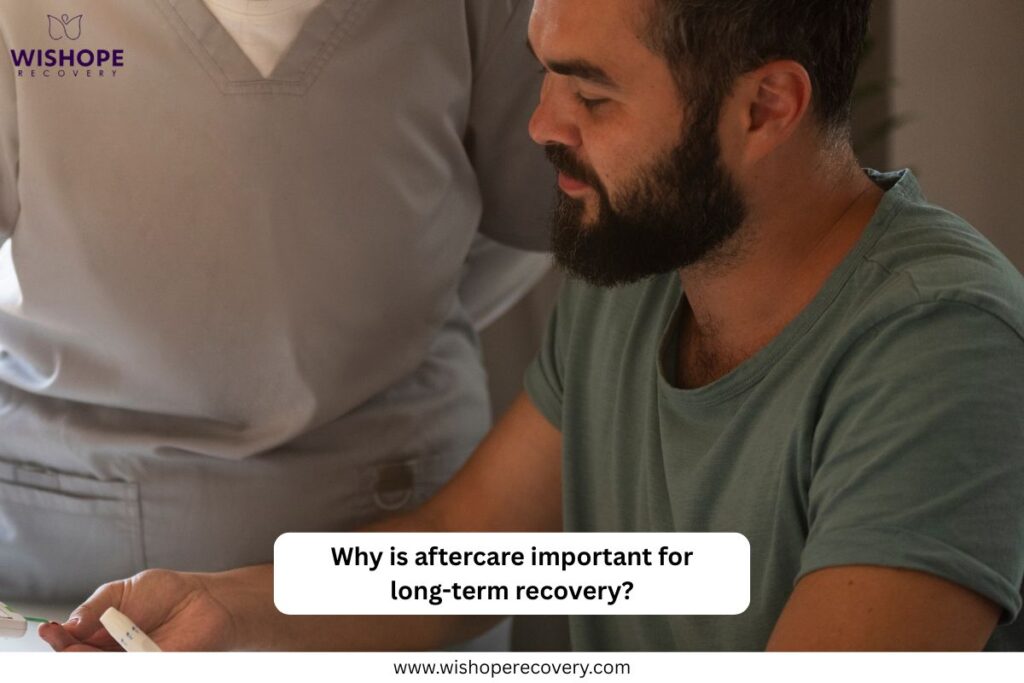Addiction recovery is not about one single event but has to be a constant process and needs unconditional support, structure, and direction. While detoxification and initial therapy are vital first steps, what often determines success is the commitment to long-term recovery programs. Aftercare serves as the channel between the first part of treatment and a healthier future, helping people feel focused, motivated, and capable of dealing with daily challenges without relapsing as they did in the past.
What services do Aftercare Outpatient Programs typically include?
Aftercare providers structure support to offer additional assistance that individuals receive after they complete primary treatment. The services may change according to the needs of the individual; however, some of the most common ones are:
- Extended Care Addiction Treatment: A structured approach that continues beyond inpatient care. It also provides continuous treatment, relapse prevention tips, and lifestyle advice to reinforce long-term sobriety.
- Outpatient Treatment Programs: Flexible treatment options that allow individuals to receive counseling, therapy, or medical support while continuing with work, school, or family responsibilities.
- Support groups and peer counseling to foster accountability and community connection.
- Family counseling sessions assist in restoring relationships and enhancing interaction.
- Relapse prevention planning involves identifying triggers and learning coping strategies.
- Holistic treatments to be facilitated, such as meditation, physical activities, or nutritional consultation, to ensure holistic well-being.
The services help them to guarantee that the recovery is not limited to initial treatment, rather it is followed by regular care that is specialised to reality-based circumstances.
What Makes an Aftercare Plan Successful?
An effective aftercare plan will not be universal. It is made with the individual needs in mind. The following are some of the things that emphasize the effectiveness of an aftercare plan:
- Consistency: A regularly scheduled intervention, such as regular therapy, meeting with a group, or counseling, helps individuals to be committed to their recovery process.
- Flexibility: Options such as outpatient substance abuse treatment or outpatient alcohol rehabilitation provide the flexibility needed for balancing recovery with daily responsibilities.
- Accountability: A support system in the form of therapists, mentors, or peers will keep an individual focused and accountable for the actions he or she takes.
- Skill Development: Aftercare programs, which include learning skills necessary to cope with adversaries, stress, and how to solve them, help one to overcome them without resorting to substances.
- Accessibility: Those programs that are convenient to attend either physically or online promote long-term commitment and increased success rates.
A combination of these factors makes aftercare a sustainable mechanism of recovery.

Is Aftercare Necessary for Everyone?
Although some people might think that running a rehabilitation program is sufficient, it is important to note that recovery programs are lifelong processes of addiction. Most individuals will benefit most with aftercare since:
- Addiction can be the result of deep-rooted behavioral and emotional habits that cannot be reversed in a short period, and only with help.
- Relapse risks are highest in the months following treatment, making aftercare a protective layer.
- It ensures ongoing access to resources, treatment, and peer networks, and these play a vital role in terms of providing motivation.
It is not necessary that all individuals require the same level of aftercare, but some form of lifelong support is highly suggested to maintain a lasting recovery. Aftercare would never be exactly the same for everyone; however, the majority of people would require some type of continuing care. It lowers the threat of relapse and fosters longer-term stability.
Who Can Benefit Most from this Programs?
Individuals who have relapsed in the past, who have co-occurring conditions, or others with poor support systems tend to benefit the most from structured aftercare. Aftercare can be particularly helpful to some groups:
- Each of those has had multiple prior relapses.
- People who have co-morbid mental issues like depression or anxiety.
- Individuals having poor family/social support structures.
- Those who are readjusting to challenging situations, i.e., stressful work or dysfunctional families.
- Adolescents who are under peer pressure and societal stimuli.
In such circumstances, what aftercare does is provide that stabilizing influence, and a safe place where continued instruction, assistance, and responsibilities may occur.
Can Aftercare Be Done Virtually or Online?
Yes, virtual aftercare is gaining popularity and provides addicts with counseling, peer groups, and other recovery resources online with more flexibility. Technology has made aftercare more accessible than ever before. The list of the currently common virtual aftercare options includes:
- Certified therapists will conduct counseling online.
- Online peer meetings and groups.
- Smartphone applications help track progress and keep the individual connected with the recovery community.
- Telehealth, medical follow-ups, and medication management.
The method of virtual aftercare is particularly effective when the patient needs flexibility because of remote areas and challenges. Online aftercare can be as effective as in real-life programs with the correct structure.
The Role of Outpatient Care in Aftercare
Outpatient programs are also important in linking the world of inpatient treatment and the world of independent living. By offering therapy and support without requiring overnight stays, outpatient treatment programs allow individuals to apply learned strategies in real-life settings while still receiving professional guidance.
- Outpatient substance abuse treatment focuses on managing cravings, addressing behavioral issues, and teaching relapse prevention skills.
- Outpatient alcohol rehabilitation provides specialized support for alcohol-related recovery, ensuring individuals stay committed to sobriety.
These outpatient services ensure recovery to be flexible, practical, and sustainable in the long-term.
Final Thoughts
Aftercare is not a recommended procedure that can be neglected, but a constituent of recovery. It creates resilience and prepares a person to face the realities of day-to-day life without returning to substances. Whether through extended care addiction treatment, outpatient substance abuse treatment, or virtual support, aftercare creates a safety net that strengthens commitment to sobriety.
Through WisHope Recovery Center, the advantage of organized aftercare systems also comes out, which has programs that enhance healing and long-term success. The recovery turns out not only to be a short-term success but a permanent positive lifestyle.

